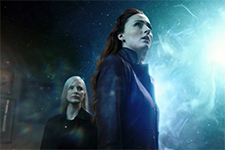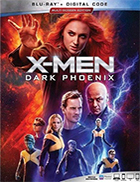Dark Phoenix
|  I have been largely baffled by the critical animosity and box office crash of Dark Phoenix, which is ostensibly the last entry in the X-Men series that began nearly 20 years ago with X-Men (2000) before Disney, which now owns the rights, inevitably reboots it sometime in the near future and integrates the characters fully into the Marvel Cinematic Universe. It is not particularly better, but certainly not any worse, than most of the films in the franchise, which have proved to be solid, durable, and sometimes genuinely moving big-screen entertainment over the past two decades. Of course, some films have clearly been better than others. James Mangold’s gritty, violent Logan (2017) is arguably the high point, followed closely by Bryan Singer’s socially conscious X2 (2003). I was left somewhat cold by the most recent entry, X-Men: Apocalypse (2016), primarily because it sacrificed the series’ deeply vested interest in blurring the lines between good and evil with a generic behemoth of a villain who wants to take over the world and smash lots of stuff in the process (which has been a frequent gripe of mine with comic book movies in general). And that is precisely what Dark Phoenix doesn’t do, yet was being treated critically and commercially like it was the worst of generic toss-offs. Written and, for the first time, directed by Simon Kinberg, who previously co-wrote X-Men: The Last Stand (2006), X-Men: Days of Future Past (2014), and X-Men: Apocalypse, Dark Phoenix tackles one of the comic book’s most acclaimed story arcs, which finds the young, but powerful telepath Jean Grey (Sophie Turner) hit by a mysterious storm in outer space that endows her with greatly increased powers, but also makes her increasingly unstable and dangerous—to both herself and others (interestingly, Kinberg had previously adapted this storyline as one plot element in The Last Stand). This event takes place at exactly the moment in the early 1990s (following the retro timeline established in 2011’s X-Men: First Class) when Professor Charles Xavier (James McAvoy), who runs a school for “mutants,” those born with an X-gene that gives them extra-human powers, has achieved political success in finding peace between humans and mutants, the former of whom tends to fear and therefore want to imprison or kill the latter. There is none-too-subtle suggestion, especially from Raven (Jennifer Lawrence), Xavier’s adopted, shape-shifting sister, that he is a bit too proud of himself and is allowing his ego to put others in danger, which is precisely how Jean Grey ends up in that mysterious storm in space (Xavier sends her and a team of X-Men to rescue the astronauts on a stranded space shuttle in orbit, an act that he sees as crucial to cementing the human belief that mutants want to help them, not harm them). There is more, though, as a prologue shows us that Jean, when she was a child, was directly responsible for causing a car crash that killed her parents, an event that Xavier purposefully represses in her mind in a bid to protect her from its psychological repercussions. Unfortunately, that choice, while made in all sincerity, only kicked the ball down the road, as Jean begins to not only remember what happened, but then has to deal with the emotional fallout at exactly the time she has become both enormously more powerful and enormously more unstable. This threatens her relationship with her boyfriend, Scott Summers/Cyclops (Tye Sheridan), and also drives a wedge between Xavier and some of his most trusted allies—not just Raven, but also Hank McCoy/Beast (Nicholas Hoult), who has long been one of the X-Men’s strongest supporters, but now begins to question whether the entire enterprise is based on the faulty foundation of Xavier’s ego. Thus, Dark Phoenix delves into the characters and their long-standing tensions, dramatizing how disagreements both small and large can move from a slow simmer into a roaring boil in short order. James McAvoy, who has been playing Xavier since X-Men: First Class, does a lot of strong work here, conveying a character who wants the best, but sometimes allows for compromises and ethically questionable decisions (in other words, he’s a recognizably human leader who resists acknowledging his limitations and mistakes). His fraught relationship with Erik Lehnsherr/Magneto (Michael Fassbender) is brought once again to the fore, as Jean visits Magneto on the remote island where he and other mutants have retreated to get away from humanity. Magneto has always been one of the most fascinating of villains—a man who commits sometimes atrocious acts out of a genuine ethos about the flawed nature of humanity—and he is given plenty of room to play both sides of the divide. Although it is not as action-packed as most comic book movies, Dark Phoenix works its way to a climactic action sequence in which most of the X-Men are locked up by heavily armed government agents on a speeding train while a group of aliens lead by Jessica Chastain’s humorless leader Vuk tries to break in. If Dark Phoenix has a flaw, it is that Kinberg tries to pack too much plot into its tight two hours (it was originally planned to be a two-part movie ala Avengers: Infinity War and Endgame), which sometimes forces him to cut corners on both narrative and character. Still, it works on its own terms and deserves neither the critical scorn nor audience apathy it has received.
Copyright © 2019 James Kendrick Thoughts? E-mail James Kendrick All images copyright © 20th Century Fox Home Entertainment | |||||||||||||||||||||||||||||
Overall Rating: 

 (3)
(3)


